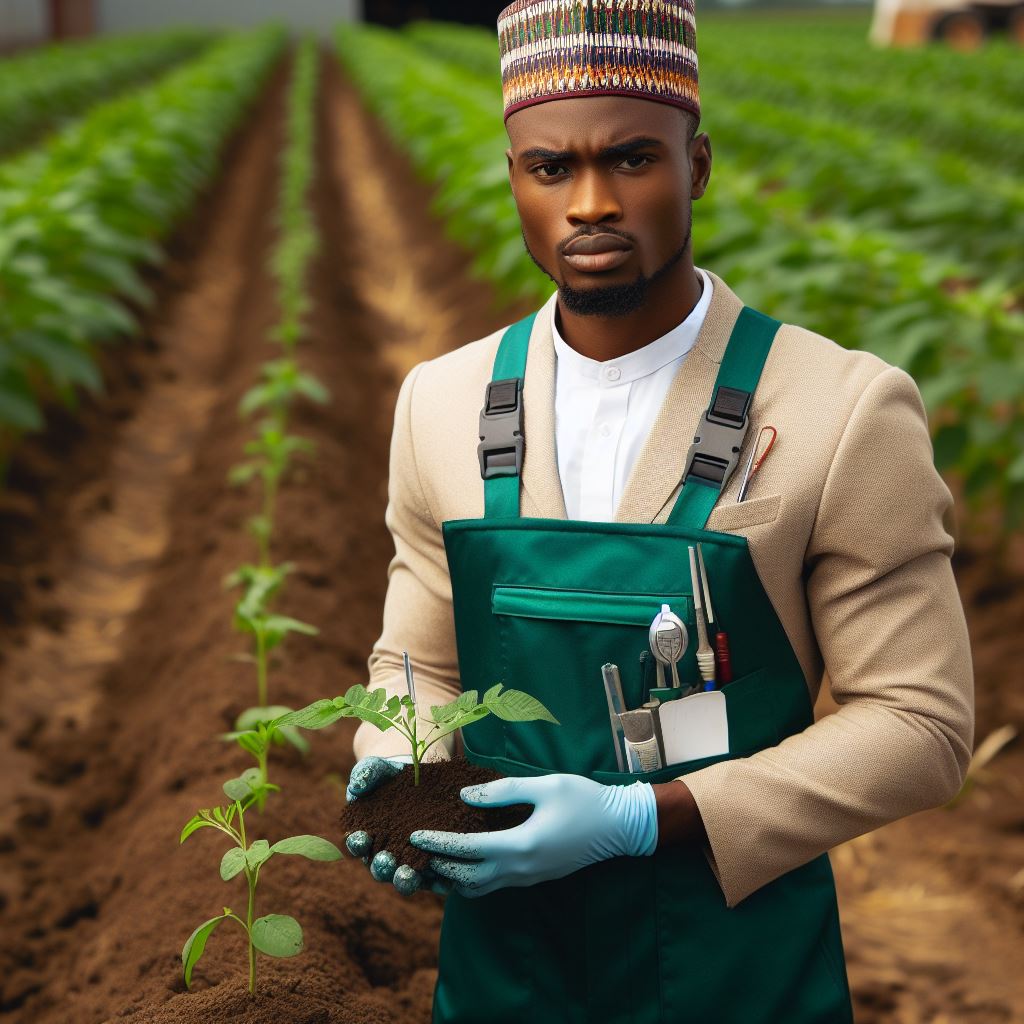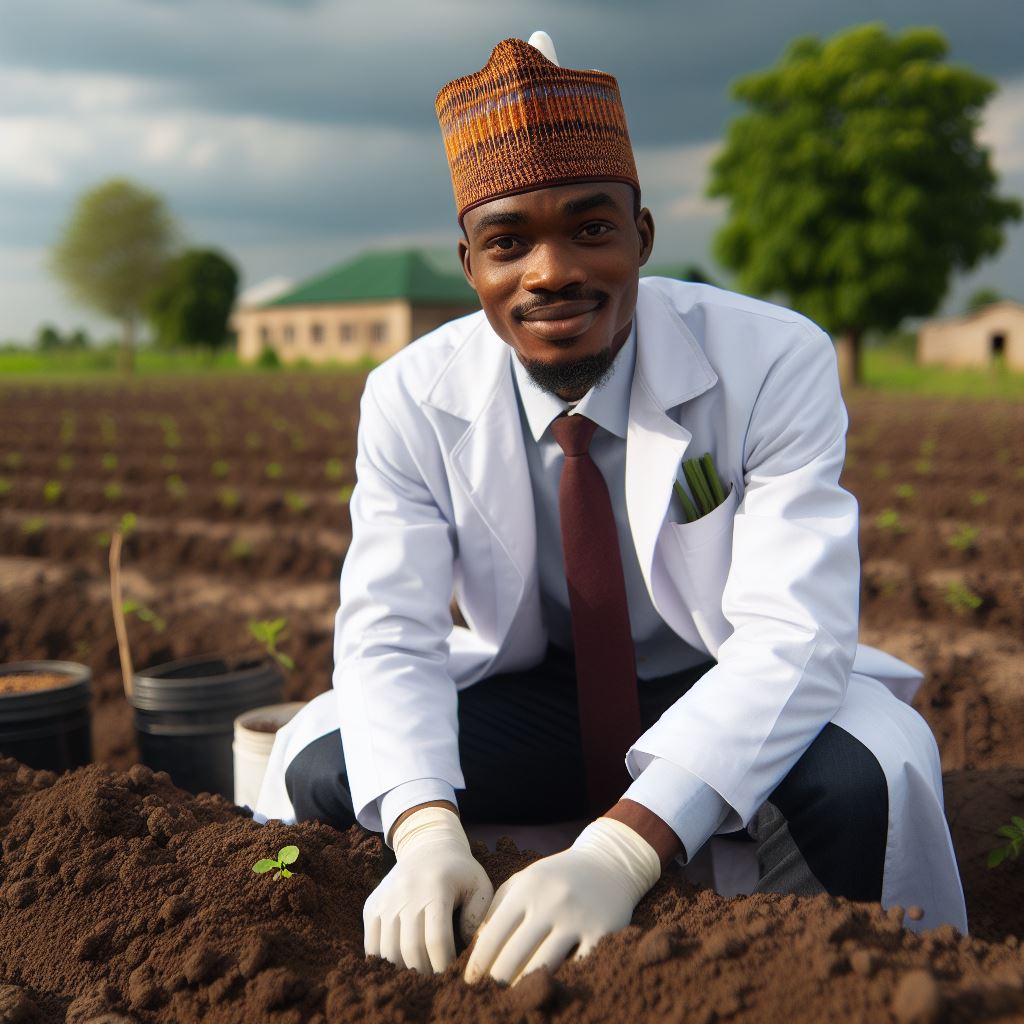Introduction
Sustainability and Organic Farming in Crop Science Curricula: In the dynamic realm of agriculture, sustainability and organic farming have become pivotal elements.
These practices not only ensure environmental well-being but also foster healthier ecosystems.
Recognizing their significance, the integration of sustainability and organic farming into Nigerian crop science curricula is imperative.
Nigeria, with its rich agricultural heritage, grapples with the challenges of a growing population and environmental degradation.
The need for sustainable agricultural practices is more pressing than ever.
By incorporating these principles into crop science curricula, we equip future agriculturists with the knowledge and skills necessary to address these challenges head-on.
The relevance of sustainability in Nigeria’s agricultural landscape cannot be overstated.
As a country heavily dependent on agriculture for livelihoods and sustenance, the incorporation of sustainable and organic farming practices is a strategic move.
It aligns with the nation’s goal of achieving food security while preserving the environment for future generations.
Organic farming, with its focus on natural inputs and minimal use of synthetic chemicals, resonates with Nigeria’s traditional farming practices.
By infusing this into crop science education, we bridge the gap between traditional wisdom and modern scientific knowledge.
This not only enriches the curriculum but also empowers students to contribute meaningfully to the agricultural sector.
In this post, we will delve into the specifics of why sustainability and organic farming are crucial components of the Nigerian crop science curricula.
From their environmental impact to their potential economic benefits, we will explore how these practices can shape the future of agriculture in Nigeria.
Join us on this journey towards a more sustainable and resilient agricultural future for Nigeria.
Current Status of Crop Science Curricula in Nigeria
The current status of crop science curricula in Nigeria is heavily focused on conventional farming methods and chemical inputs. There is limited emphasis on sustainability and organic farming.
The traditional focus on conventional farming methods and chemical inputs
The traditional approach to crop science education in Nigeria has centered around conventional farming methods.
This approach involves the use of synthetic pesticides, fertilizers, and genetically modified organisms to maximize crop yields.
Unfortunately, this conventional approach to farming has resulted in several negative consequences.
The excessive use of chemical inputs has led to soil degradation, loss of biodiversity, and pollution of water sources. It is clear that a more sustainable and environmentally-friendly approach is needed.
The limited emphasis on sustainability and organic farming
Despite the need for sustainable agriculture practices, the emphasis on sustainability and organic farming in Nigerian crop science curricula is minimal.
Most educational institutions still prioritize conventional farming, largely ignoring the importance of organic practices.
However, there are some existing initiatives and courses related to sustainable agriculture in Nigeria. These initiatives aim to promote the adoption of organic farming methods and emphasize sustainable practices.
Existing initiatives or courses related to sustainable agriculture
One such initiative is the Nigerian Organic Agriculture Network (NOAN), which is a group of organizations and individuals committed to promoting organic farming in the country.
NOAN conducts training programs and workshops to educate farmers and students about the benefits of organic farming.
In addition, some universities and agricultural institutions offer courses or modules that focus on sustainable agriculture.
These courses cover topics such as agroecology, organic crop production, and sustainable soil management.
Despite these initiatives and courses, the overall emphasis on sustainability and organic farming in Nigerian crop science curricula remains limited.
There is a need for a comprehensive integration of sustainable agriculture practices into the curriculum to ensure a more environmentally-friendly and economically viable future.
In fact, the current status of crop science curricula in Nigeria predominantly focuses on conventional farming methods and chemical inputs.
The limited emphasis on sustainability and organic farming is a concern considering the negative impacts of conventional agriculture.
However, there are existing initiatives and courses that promote sustainable agriculture, and it is crucial to integrate these practices more extensively into the curriculum for a more sustainable future.
Read: Postgraduate Opportunities in Crop Production Technology
Importance of Sustainability in Agriculture
The concept of sustainability in relation to agriculture
The concept of sustainability in agriculture involves the practice of farming in a way that meets the needs of the present without compromising the ability of future generations to meet their own needs.
The benefits of sustainable farming practices for farmers, consumers, and the environment
There are numerous benefits of sustainable farming practices for farmers, consumers, and the environment. These include:
- Environmental Protection: Sustainable farming methods aim to minimize the use of synthetic chemicals, reduce soil erosion, conserve water, and protect biodiversity.
- Improved Soil Health: By adopting sustainable practices such as crop rotation, cover cropping, and organic fertilizers, farmers can enhance soil fertility and structure.
- Increased Crop Resilience: Sustainable agriculture practices help build resilient crops that can withstand pests, diseases, and changing climatic conditions.
- Enhanced Food Safety: Sustainable farming emphasizes the use of natural inputs and minimizes the presence of harmful residues in crops, leading to safer food for consumers.
- Conservation of Natural Resources: Sustainable agriculture focuses on efficient utilization of water, energy, and land resources, ensuring their availability for future generations.
- Economic Benefits: Sustainable farming can lead to increased profitability for farmers through reduced input costs, enhanced soil health, and improved market access for sustainably produced products.
- Support for Local Communities: Sustainable agriculture promotes local food production, creating employment opportunities and contributing to regional economic development.
The global trends and increasing demand for sustainably produced food
There is a growing global trend towards the demand for sustainably produced food.
Consumers are becoming more conscious of the environmental and social impacts of their food choices and are willing to pay a premium for products that are produced sustainably.
Major food retailers and restaurants around the world are responding to this demand by sourcing sustainably produced ingredients.
Additionally, governments are implementing policies to incentivize and regulate sustainable agricultural practices.
Nigeria, as a major agricultural producer, has also recognized the importance of sustainability in the crop science curricula.
Transform Your Career with Expert Guidance
Get personalized mentorship consulting that’s tailored to your unique path. Our expert advice is actionable and exclusive.
Get StartedIntegrating sustainable farming practices into agricultural education can help develop a new generation of farmers who are equipped with the knowledge and skills to adopt sustainable practices.
This can lead to numerous benefits for Nigeria, including improved food security, reduced environmental degradation, and increased competitiveness in the global agricultural market.
In short, sustainability plays a critical role in agriculture. It ensures that our agricultural systems are resilient, environmentally friendly, and economically viable.
By embracing sustainable farming practices, farmers can reap numerous benefits, consumers can enjoy safe and nutritious food, and the environment can be protected for future generations.
Read: Postgraduate Opportunities in Crop Science in Nigeria
Benefits of Organic Farming
Biodiversity Preservation
Organic farming encourages the conservation and enhancement of biodiversity.
Organic farmers avoid using chemical pesticides and foster natural pest control through the promotion of beneficial insects and the use of ecological habitats.
By preserving diverse ecosystems, organic farming contributes to the protection of native plants, animals, and microorganisms.
Reduced Environmental Impact
Organic farming methods have a lower environmental footprint compared to conventional farming. The avoidance of synthetic inputs reduces the contamination of water sources and soil pollution.
Furthermore, organic farming practices promote the responsible management of resources, including water and energy conservation.
Enhanced Nutritional Value
Organic crops have been found to contain higher levels of certain nutrients compared to conventionally grown crops.
Studies have shown that organically grown fruits and vegetables have higher concentrations of vitamins, minerals, and antioxidants.
Additionally, organic livestock raised on pasture have been found to produce meat and dairy products with higher levels of healthy fats.
Improved Taste and Flavor
Many consumers appreciate the superior taste and flavor of organic food.
The natural and sustainable farming methods used in organic production promote the development of crops with enhanced sensory qualities.
Organic fruits and vegetables are often described as having more intense flavors and aromas.
Economic Benefits for Farmer
Organic farming presents potential economic advantages for farmers. Through organic certifications, farmers can access niche markets and receive premium prices for their organic products.
The growing demand for organic food offers opportunities for small-scale farmers to diversify their income and improve their livelihoods.
Climate Change Mitigation
Organic farming has the potential to contribute to climate change mitigation by sequestering carbon in soils.
By focusing on organic matter management and soil conservation practices, organic farmers can store carbon and reduce the emission of greenhouse gases.
This helps combat global warming and contributes to the sustainability of agriculture.
In essence, organic farming offers numerous benefits for both the environment and farmers.
The emphasis on sustainable practices, improved soil health, and biodiversity preservation make organic farming an appealing alternative to conventional agriculture.
Furthermore, the potential economic advantages and the growing demand for organic products create opportunities for farmers to thrive in sustainable agricultural systems.
By adopting organic farming methods, Nigerian crop science curricula can contribute to the promotion of sustainable food production and the preservation of natural resources.
Read: Student Experiences: Studying Crop Production in Nigeria

Challenges and Barriers to Promoting Sustainability and Organic Farming in Nigerian Crop Science Curricula
Integrating sustainable agriculture into curricula faces several major obstacles that hinder its promotion in Nigerian crop science education.
These challenges stem from cultural and societal influences that favor conventional farming methods, as well as regulatory hurdles and limited access to organic inputs and certification services.
Cultural and Societal Influences
- Cultural beliefs and practices often prioritize conventional farming, considering it as the traditional and more reliable approach.
- Societal pressure to produce high crop yields and meet market demands discourages the adoption of sustainable and organic farming methods.
- Perceived prestige associated with modern technologies and synthetic inputs makes organic farming less attractive to aspiring farmers.
Regulatory Challenges
- Inadequate policies and regulations specifically targeting sustainable and organic farming methods pose a significant barrier.
- Lack of clear guidelines for organic certification processes and limited governmental support obstruct the integration of organic farming into crop science curricula.
- The absence of incentives or subsidies for organic farmers hinders their motivation to learn and adopt sustainable practices.
Limited Access to Organic Inputs and Certification Services
- Nigeria faces significant challenges in accessing organic inputs such as seeds, fertilizers, and pest control substances.
- High costs associated with organic inputs and certification services make them inaccessible to many farmers and educational institutions.
- Limited availability of trained personnel to provide organic farming education and certification services reduces the scope of sustainable agricultural integration into curricula.
To overcome these obstacles, it is crucial to address each challenge systematically and collaboratively:
Promoting Awareness and Changing Mindsets
Efforts should be made to increase awareness about the benefits of sustainable and organic farming among farmers, policymakers, and the general public.
This awareness can help shift cultural and societal influences towards more environmentally friendly practices.
Strengthening Policies and Regulations
Governmental bodies should develop comprehensive policies and regulations that actively promote sustainable and organic farming.
This includes establishing clear certification processes, providing subsidies, and incentives for organic farmers, and encouraging the development and availability of organic inputs.
Improving Access and Affordability
Efforts should be made to enhance the affordability and accessibility of organic inputs and certification services.
This can involve exploring cost-effective production methods, promoting research and development of organic farming technologies, and creating channels for farmers to access organic products and services.
Enhancing Education and Training
Investing in the training of agricultural professionals and educators is crucial for the successful integration of sustainable and organic farming practices into crop science curricula.
This can be achieved through workshops, seminars, and partnerships with organizations experienced in organic farming.
Supporting Research and Innovation
Encouraging research and innovation in sustainable agriculture is essential to develop effective and context-specific organic farming practices.
Funding research projects and establishing collaborations between research institutions and farmers can stimulate the creation of knowledge and technologies that support sustainable agriculture.
Basically, promoting sustainability and organic farming in Nigerian crop science curricula faces numerous challenges.
Overcoming cultural, societal, regulatory, and access barriers requires a multi-stakeholder approach.
By raising awareness, strengthening policies, improving access, enhancing education, and supporting research, Nigeria can move towards a more sustainable and organic agricultural future.
Read: Challenges Facing Crop Science Education in Today’s Nigeria
Successful Examples and Best Practices
In Nigeria’s dynamic agricultural landscape, pioneering educators are reshaping crop science curricula to embrace sustainability and organic farming.
Case studies or examples where sustainability and organic farming have been successfully integrated into crop science curricula in Nigeria
One notable success story is the partnership between the Federal University of Agriculture and a local organic farming cooperative.
In this collaborative effort, students actively engage in sustainable farming practices. They cultivate organic crops, employing innovative techniques learned in the classroom.
This hands-on approach bridges theory and practice, fostering a deeper understanding of sustainable agriculture.
The outcomes are remarkable. Graduates exhibit enhanced problem-solving skills, well-equipped to address modern agricultural challenges.
The positive impacts extend beyond academia, reaching local communities. The cooperative’s organic produce not only meets market demand but also promotes environmental stewardship.
Another shining example is the incorporation of sustainability modules into existing courses.
This strategic integration ensures that every crop science student receives comprehensive training in organic farming principles.
The result? A new generation of agricultural professionals with a holistic understanding of the ecological and economic dimensions of farming.
The positive outcomes and impacts of these initiatives
The ripple effects of these initiatives are palpable. Improved soil health, reduced reliance on synthetic inputs, and increased biodiversity characterize the success stories.
Moreover, local farmers witness firsthand the benefits of sustainable practices, encouraging wider adoption.
The lessons learned and potential strategies for scaling up these practices
Lessons learned from these endeavors emphasize the importance of collaboration between academia and local farming communities.
Such partnerships are essential for tailoring curricula to address regional challenges.
Additionally, continuous assessment and adaptation of teaching methods ensure the relevance and effectiveness of sustainability education.
Scaling up these practices requires strategic planning and government support. Advocacy for policy changes that promote sustainable agriculture education is crucial.
By building on these successful examples, Nigeria can cultivate a resilient and environmentally conscious agricultural sector, ensuring a sustainable future for generations to come.
Recommendations for Integration
In order to truly integrate sustainability and organic farming into Nigerian crop science curricula, it is essential to propose specific strategies and approaches that can be implemented.
Specific strategies and approaches for incorporating sustainability and organic farming into Nigerian crop science curricula
These strategies should go beyond simply adding a section on sustainability or organic farming, but rather should infuse these concepts throughout the entire curriculum.
Some recommendations for accomplishing this include:
- Integrate sustainability and organic farming principles into existing courses: Incorporate topics such as soil health, crop rotation, and holistic resource management into relevant courses.
- Create new courses or modules: Develop specialized courses dedicated to sustainability and organic farming, covering topics like agroecology, organic pest management, and sustainable irrigation practices.
- Offer practical training programs: Provide hands-on experiences for students, allowing them to apply sustainable and organic farming techniques in real-life scenarios.
- Establish research collaborations: Foster partnerships between universities, research institutions, and farmers to conduct studies on sustainable and organic crop production.
- Encourage interdisciplinary approaches: Facilitate collaboration between crop science students and students from other disciplines such as environmental science, economics, and sociology to promote a holistic understanding of sustainability in agriculture.
- Engage with stakeholders: Actively involve government agencies, NGOs, and farmers’ associations in curriculum development, ensuring alignment with national agricultural policies and practices.
The need for updated textbooks, training programs, and research collaborations
In addition to incorporating sustainability and organic farming into the curriculum, there is a need for updated textbooks that reflect current knowledge and best practices.
Current textbooks may not adequately cover these topics or may present outdated information.
Therefore, it is crucial to develop and disseminate updated textbooks that provide accurate and comprehensive information on sustainable and organic crop production techniques.
Furthermore, training programs should be established to educate crop science instructors on the latest advancements in sustainability and organic farming.
This will enable them to effectively teach and mentor students in these areas.
Additionally, offering workshops and educational opportunities for practicing farmers can help bridge the gap between academia and the agricultural community, ensuring knowledge transfer and adoption of sustainable practices.
The importance of partnerships with stakeholders, such as government agencies, NGOs, and farmers’ associations
Partnerships with stakeholders are essential for successful integration of sustainability and organic farming into Nigerian crop science curricula.
Collaboration with government agencies can facilitate access to funding, policy support, and regulatory frameworks that promote sustainable practices.
NGOs can provide technical assistance, training, and extension services to farmers, helping them transition to sustainable and organic farming methods.
Farmers’ associations can contribute practical knowledge and experience, ensuring the curriculum aligns with on-the-ground realities and addresses the needs of farmers.
In a nutshell, integrating sustainability and organic farming into Nigerian crop science curricula requires specific strategies and approaches.
This can be achieved by updating textbooks, offering specialized training programs, and fostering partnerships with stakeholders.
By taking these steps, Nigeria can ensure that future generations of crop scientists are equipped with the knowledge and skills needed to address the challenges of sustainable agriculture and contribute to the development of a more sustainable food system.
Conclusion
All in all, the incorporation of sustainability and organic farming in the Nigerian crop science curricula is of utmost importance.
Integrating these concepts can bring numerous benefits and have long-term impacts on agriculture in Nigeria.
By adopting sustainable practices and organic farming techniques, Nigerian farmers can enhance soil fertility, protect water resources, and conserve biodiversity.
This will contribute to the overall sustainability of the agricultural sector.
Furthermore, the integration of sustainability and organic farming in the curricula will equip future agricultural professionals with the necessary knowledge and skills to address the challenges faced by the agricultural sector.
It is crucial to recognize the potential economic gains and health benefits associated with sustainable agriculture.
Organic farming can lead to increased food security, improved nutrition, and reduced exposure to harmful chemicals for both farmers and consumers.
However, further research is needed to explore the specific implementation strategies and potential barriers to integrating sustainability and organic farming into the Nigerian crop science curricula.
Collaboration among academic institutions, government agencies, and industry stakeholders is essential for successful implementation.
Additionally, policy support is crucial for driving the adoption of sustainable agricultural practices at a national level.
Governments should provide incentives and create enabling environments for farmers to transition to organic farming and sustainable practices.
Overall, promoting sustainability and organic farming in Nigeria is not only necessary for environmental conservation but also for the long-term economic and social well-being of the nation.
Continued efforts towards research, collaboration, and policy support are essential to achieve a sustainable future for Nigerian agriculture.




